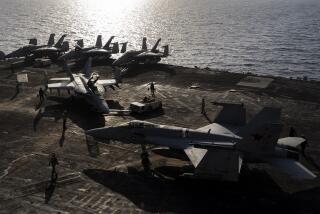Navy Brands Offshore Oil Rigs Training Hazard : Coastline: Though their reasons differ, military officials find themselves aligned with environmentalists in opposing drilling off California.
Navy and Marine Corps officials Wednesday called offshore oil rigs a danger to ships, submarines and military operations off the coast.
The rigs pose an “unacceptable safety hazard,” according to a Navy report released Wednesday by Reps. Duncan Hunter (R-Coronado) and Ron Packard (R-Carlsbad).
As Interior Secretary Manuel Lujan studies the California coast for offshore drilling sites, Navy officials released a report explaining that, during Navy exercises simulating wartime conditions, submarines might not use active sonar and would be unable to detect oil rigs.
Oil rigs and noise from drilling would interfere with a variety of exercises now conducted, including sea-skimming missile and acoustic instrumentation tests, according to the report issued by Capt. J. B. Hinkle, director of Navy Programs, in Washington.
“The Navy is aware of the potential hazards that offshore oil rigs present to navigation of submerged submarines and surface shipping,” said Lt. James Wood, a Washington-based Navy spokesman. “As a matter of normal operating procedures, the Navy monitors the location of U.S. oil rigs to ensure the safety of our operations.”
The report also catalogued two cases in which submarines ran into oil rigs in the last eight years, one involving a U.S. submarine.
The Navy has 564 ships, including 100 attack submarines and 35 ballistic missile submarines, Wood said. About 100 of the Navy’s ships are based in the San Diego area, where the Marine Corps and the Navy conduct extensive exercises.
Marine Corps officials said oil rigs also pose hazards for their personnel at sea. Marines routinely train in an area stretching 25 nautical miles out to sea and along 17 miles of coast, said Gunnery Sgt. Stan Pederson, a Marine spokesman.
“We are opposed to any surface or sub-surface structures along Camp Pendleton’s coastline,” said a statement issued by Camp Pendleton officials. “Any structure in this area would have a severe negative impact on amphibious training and the bases’ role in national defense.”
Navy spokesman Cmdr. David Dillon added, “It would interfere with our ability to train off the coast. Camp Pendleton and the area is a national asset for training--you cannot replace it.”
The thorny issue of offshore drilling may forge partnerships between unconventional allies: military personnel and environmentalists. At a hearing in Carlsbad earlier this year, the two groups both opposed drilling.
“It was an unusual alignment,” Dillon said.
During Wednesday’s press conference in Washington, Hunter and Packard cited the Navy report and called for a special hearing, saying the oil rigs would pose hazards to military personnel and to the environment.
Describing the dangers of a collision between a submarine and a stationary rig pumping oil, Packard said, “We could have a spill that would truly devastate our beach line. It could be catastrophic for our area.”
Hunter said, “It’s alarming. There’s substantial danger. The military leadership in the Navy and Marine Corps does not want to see oil rigs in the training area. They’ve kept quiet because of a discipline and a loyalty to their President and to the secretary of the interior.”
There is now a moratorium on drilling off California, and, earlier this year, President Bush created a task force to study the effect of such drilling, which he has said he favors as a means of lessening the nation’s reliance on foreign oil. The task force is expected to issue its recommendations in January.
In a letter to Lujan, who heads the task force, Hunter and Packard say that lifting the President’s moratorium on drilling “would have serious implications for our national security.”
Two accidents were cited in the Navy report. One occurred last year when a submerged 500-ton West German submarine ran into a Norwegian offshore oil platform in the North Sea. There were no injuries.
The other incident involved an American submarine, the Archerfish, which hit an ocean oil rig--officials declined to say where the rig was situated--and caused an estimated $1 million in damage in 1981. The Archerfish is based in Groton, Conn.
More to Read
Sign up for Essential California
The most important California stories and recommendations in your inbox every morning.
You may occasionally receive promotional content from the Los Angeles Times.










